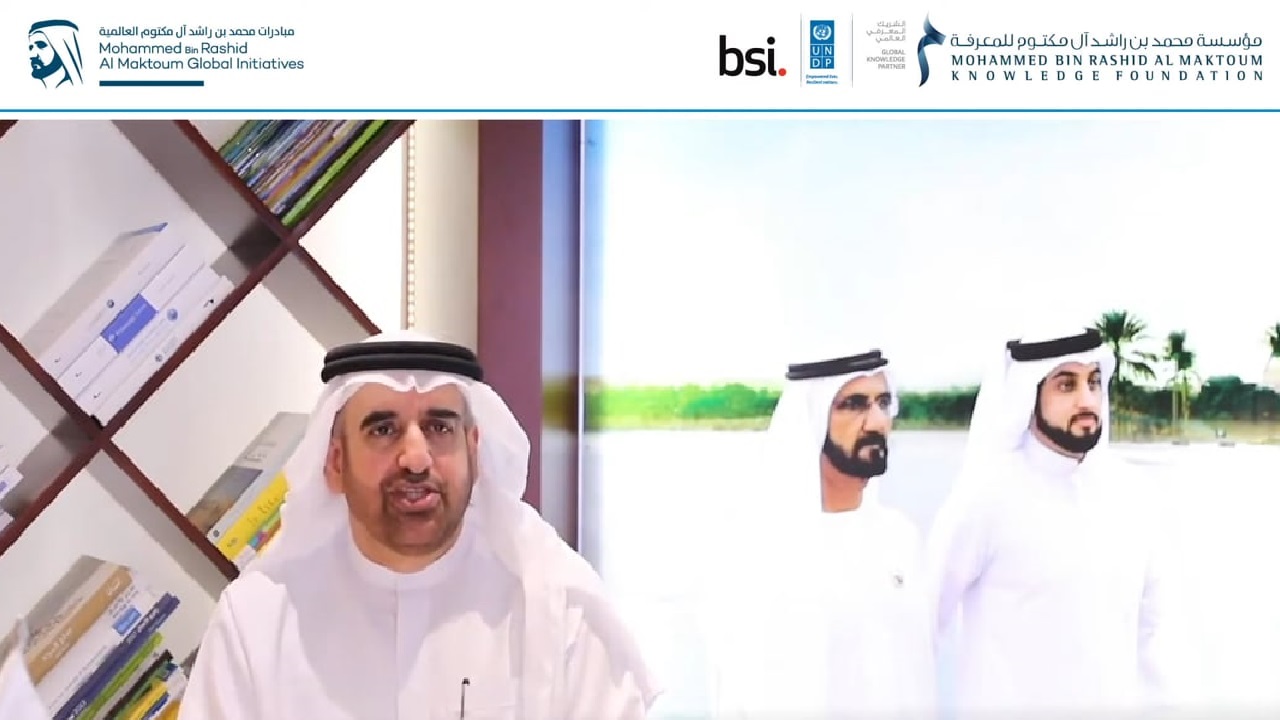
Exploring the knowledge base on KM and sustainability in the context of the Sustainable Development Goals (SDGs)
This article is part of an ongoing series of articles on KM in international development.
In September 2015, the member states of the United Nations (UN) General Assembly ratified the Sustainable Development Goals (SDGs), a transformational agenda to address the problems facing the global community. The SDGs follow the earlier Millennium Development Goals (MDGs). Although some targets were not met, the MDGs achieved a significant reduction in global poverty, and substantial progress was made across all eight goals.
In a previous RealKM Magazine article, we’ve featured the Agenda Knowledge for Development1, a significant document that shares a vision of how knowledge and knowledge societies can contribute to an inclusive approach to human development in the context of the SDGs.
A newly published study2 by researchers from the Center for Research on Sustainable Leadership at Mahidol University in Thailand has the potential to support the implementation of the Agenda Knowledge for Development, and, very importantly, to inform other future studies that can support the Agenda.
The Center for Research on Sustainable Leadership researchers advise that their work constitutes the first bibliometric review of the KM and sustainability literature. While a systematic review could offer insights on research gaps in the literature, scientific review through bibliometric analysis provides a different, comprehensive view that provides a vital knowledge base for evidence-based decisions in regard to research priorities. As Clarivate Analytics (formerly Thomson Reuters) advises3, “Bibliometrics (sometimes called Scientometrics) turns the main tool of science, quantitative analysis, on itself.”
The researchers used the conceptual framework shown in Figure 1 as the basis of their study. The term “sustainability” has a range of definitions in various contexts, however for the purposes of their study the researchers have defined sustainability as the three overlapping pillars of environmental, social and economic issues:
- Environmental sustainability focuses on the input, waste, and capacity of natural resources that need to be maintained in the environment.
- Social sustainability touches upon social issues to create sustainable communities through social cohesion, equity, justice, and inclusion.
- Economic sustainability is concerned with a sustained level of economic growth, development, and productivity from limited capital.
Although the study was not a systematic review, source articles were identified and extracted in accordance with the Preferred Reporting Items for Systematic Reviews and Meta-Analyses (PRISMA) guidelines. After duplicate items were removed, the final database consisted of 3025 articles, a large proportion of which were conference papers. VosViewer was then used for citation analysis.
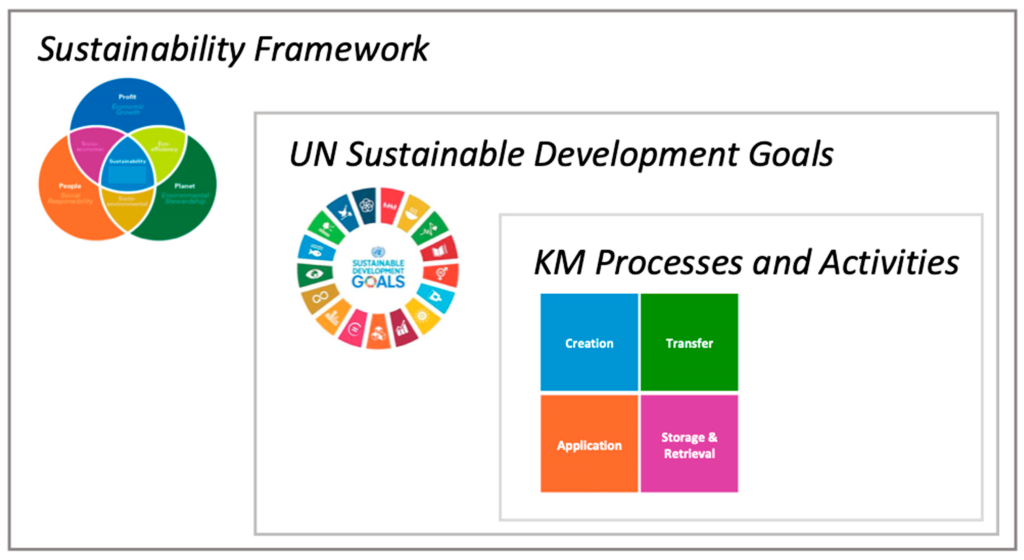
Results
The growth trajectory in the literature shows a rising trend of interest in KM and sustainability (Figure 2).
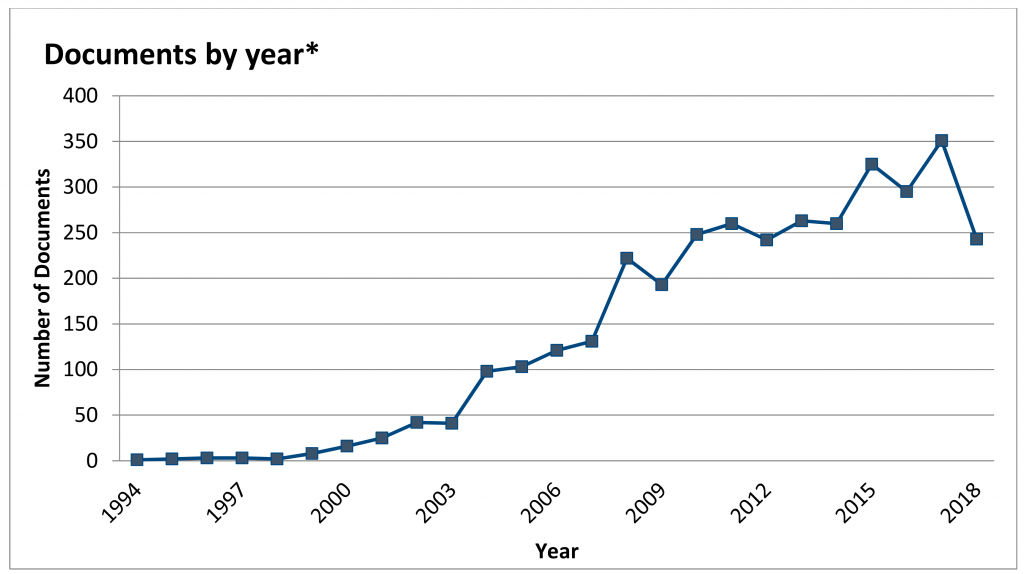
The heat map of KM and sustainability literature by country reveals dominant contributions from the USA, UK, China, and Australia (Figure 3). Other major contributors with over 100 publications included Germany, Canada, Malaysia and the Netherlands.
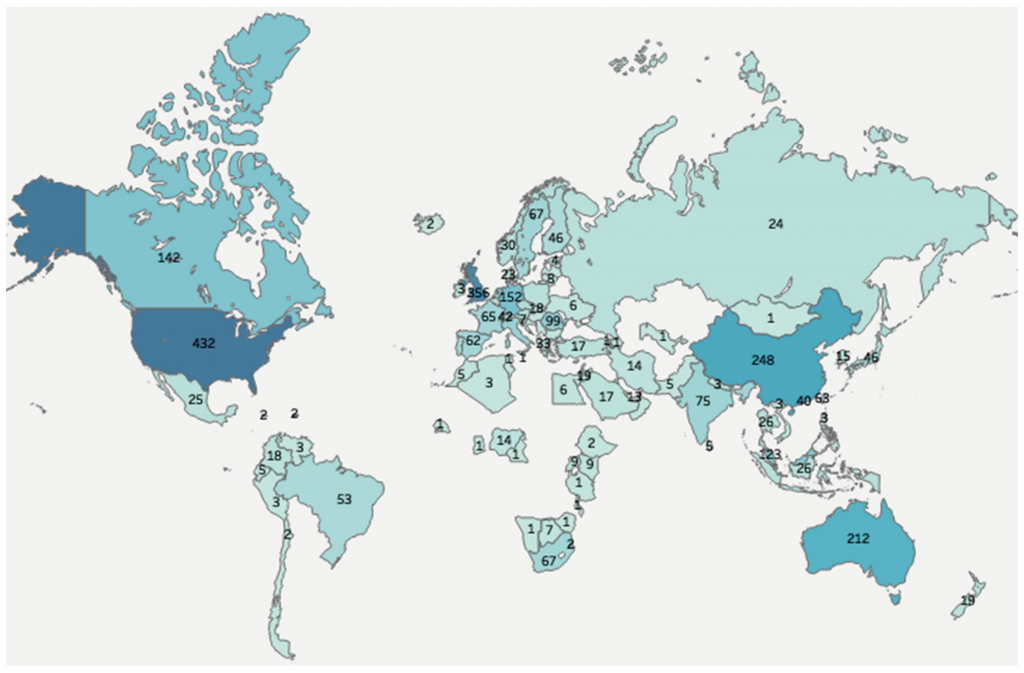
Analysis of the intellectual structure of the knowledge base regarding KM and sustainability identified four main schools of thought within the field (Figure 4). The red and green clusters were largest, suggesting greater breadth of influence in this field. The clusters don’t overlap with each other, however, a group of nodes in the middle of the figure shows the links between KM and sustainability. The yellow cluster also illustrated these interactions. The green cluster was closely related to the blue cluster, as seen by their proximity.
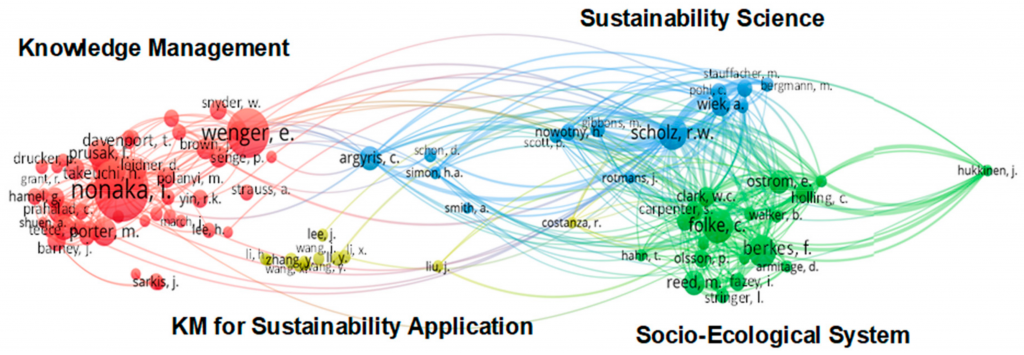
To identify the key topics studied by scholars researching KM and sustainability, a top 50 co-keyword analysis was carried out. The topics could be categorised into four clusters (Figure 5).
An example of a socio-environmental sustainability study is in regard to the use of KM tools to support sustainable forestry, such as intelligent agents, expert systems and cognitive maps for planning processes or web-based tools for participatory planning. Under the Strategy and Management theme, an example is a study looking at the integration of an information system, knowledge, and supply chains to develop sustainability capabilities beyond mere energy consumption reduction. Another example study can be located within both the macroeconomic management and knowledge creation themes. It discussed the use of knowledge creation to build open-ended innovation and improvements in order to increase standards of living.
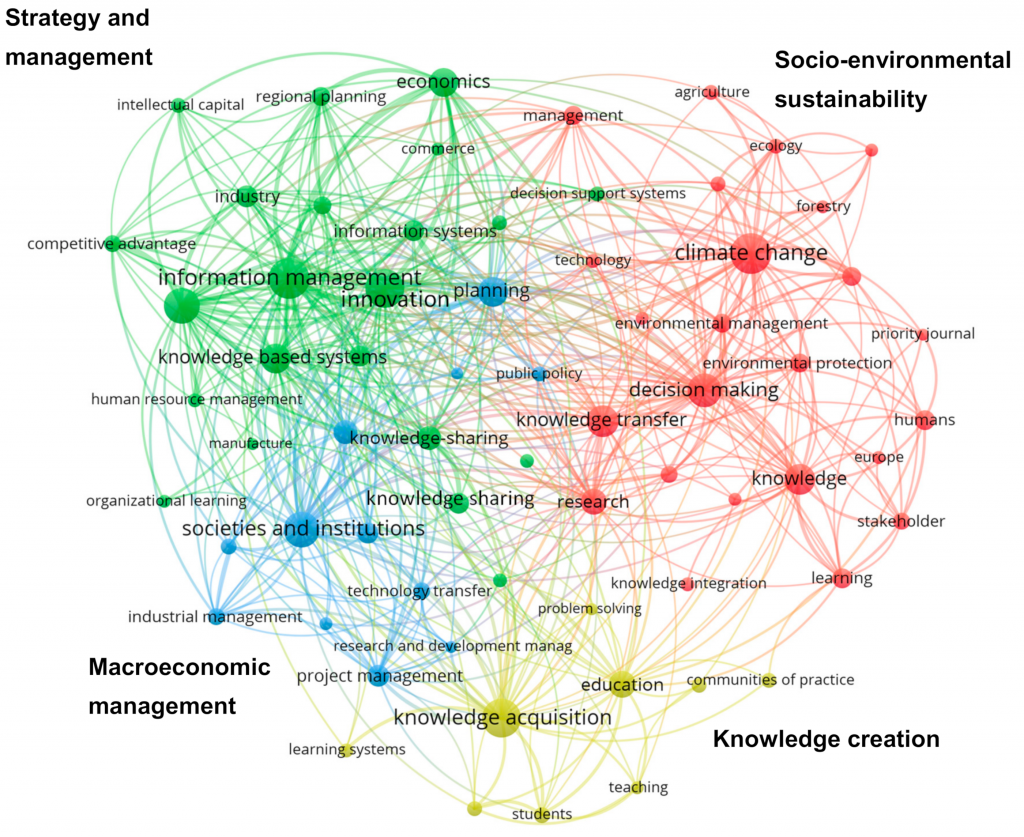
The same co-occurrence of keywords analysis was also used to identify topical trends in KM and sustainability research. Instead of viewing the coloured clusters of the network map, an overlay visualisation was prepared based on the average publication year of documents associated with specific keywords (Figure 6).
It can be seen that topics associated with macroeconomic management and strategy and management represent relatively mature lines of inquiry. Topics within these themes included societies and institutions, knowledge acquisition, project management, and information systems . For example, knowledge management application in Australian transportation infrastructure projects to promote sustainability. The latter topics of interest included climate change, knowledge, learning, and communities of practice. These topics were a part of socio-environmental sustainability and knowledge creation. For instance, a study about adapting to climate change stated that natural resource management organisations could enhance knowledge transfer through tailored information delivery to improve exchanges between stakeholders.
Additional trending topics include economics, regional planning, commerce, and intellectual capital. These topics were largely located in the strategy and management theme in social and economic aspects. An example of a study about KM and regional planning is in regard to the co-creation in sustainable urban planning where KM processes are adopted to facilitate collaboration in Canada. Another example of a trending topic is the study about the application of KM and intellectual capital to promote sustainable development in Italian healthcare organisations.
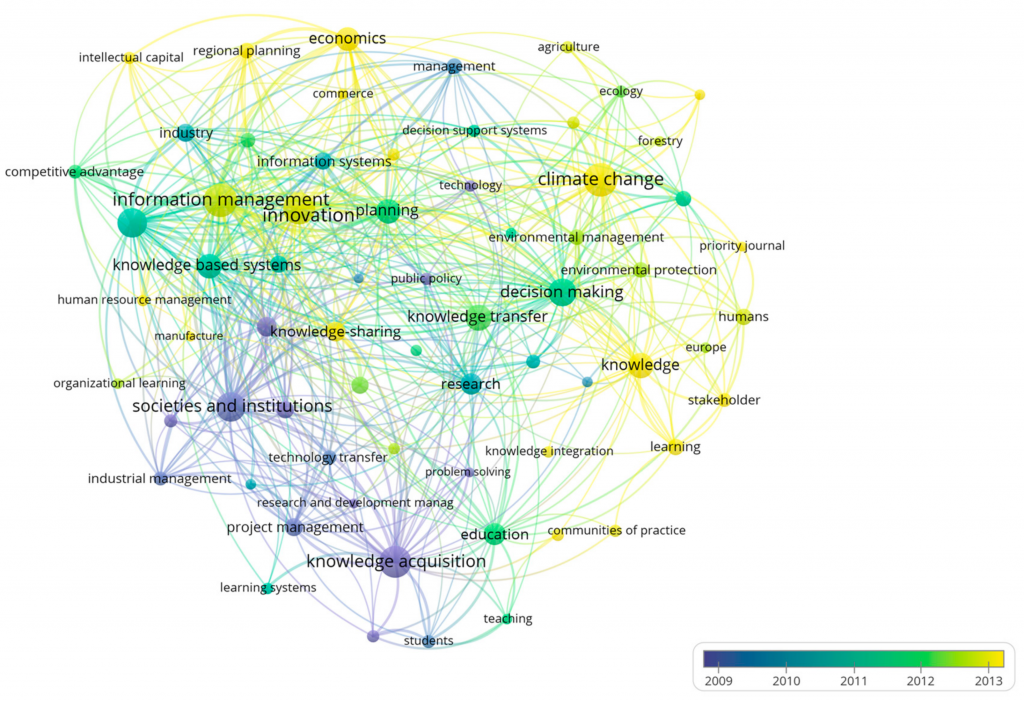
Conclusions
From their bibliometric study, the researchers have drawn a range of conclusions, including:
- As the majority of the database consisted of conference papers, it can be assumed that studies of KM in sustainability are only beginning to become established in mainstream research journals.
- The accelerating growth trajectory of the KM in sustainability literature suggests, however, that this field is rapidly progressing in line with changing management practices that increasingly seek to incorporate new technologies for managing knowledge around the world.
- Most authors contributing to the KM in sustainability literature came from developed countries such as the USA and in Europe. Their leadership in this literature reflects efforts in economically developed societies to achieve SDGs in parallel with economic growth. The less frequent representation of authors from developing countries may reflect broader patterns of scholarly productivity or later adoption of KM practices for sustainability in developing countries.
- These trends with respect to the geographical distribution of this literature lead to two recommendations. First, KM represents a highly salient enabler for sustainability in developing as well as developed societies. Second, scholars should prioritise research on the application of KM for sustainability in developing societies. This research will have broad and immediate applicability across a wide range of international contexts.
- Authors and documents identified in the study can be used as a ‘reading list’ for those who wish to learn more about the topic of KM in sustainability.
- Knowledge is a source of competitive advantage with salient implications for strengthening the sustainability of organisations.
- Education, learning, and knowledge sharing are key processes within KM and Sustainability. Through double-loop learning, managers and organisations are able to create “sustainable solutions” to the complex problems that characterise sustainability science.
- Advancements in information technology allow people to connect without limitations in time and space. This application of information technology (IT) to KM is not limited to the real world but can also take place in the virtual world with those who participate in a community of practice to share knowledge. If used appropriately, IT platforms enable KM to enhance the dissemination of sustainability solutions more broadly (e.g., knowledge banks, knowledge exchange platforms).
- Socio-economic management, including sub-topics such as economics, regional planning, commerce and intellectual capital, represents emerging trends in the field of KM and Sustainability. State, private and non-profit organisations are increasingly incorporating KM practices in order to achieve the SDGs. Thus, the study findings suggest a trend towards greater cooperation between societies and organisations in planning for sustainability, with the implication that KM will play an increasingly important in global sustainability efforts.
Article source: Pattarin Sanguankaew and Vichita Vathanophas Ractham, CC BY 4.0.
Header image source: Wikimedia Commons, CC BY-SA 3.0.
References:
- Brandner, A. & Cummings, S. (2018). Agenda Knowledge for Development, Third Edition. Knowledge for Development Partnership, Austria. ↩
- Sanguankaew, P. & Ractham, V.V. (2019). Bibliometric Review of Research on Knowledge Management and Sustainability, 1994–2018. Sustainability, 11(16), 4388. ↩
- Thomson Reuters (2014). Whitepaper Using Bibliometrics: A guide to evaluating research performance with citation data. 2008. Acesso em, 20(10). ↩
Also published on Medium.



